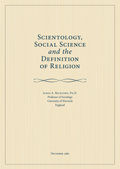My remarks are addressed to the question of whether Scientology would be defined as a religion according to the criteria conventionally used by social scientists specialising in the analysis of what they consider to be religious phenomena.
There is considerable diversity among the conceptualisations and definitions of religion employed by social scientists. The choice of conceptualisation and definition reflects both a wide variety of underlying assumptions about the nature of social reality and variations in the purpose of conceptualising or defining religion. Given the generally instrumental (and distinct from appreciative or evaluative) character of social scientific understanding, it is not surprising that concepts and definitions are judged not in terms of their truth or falsity but, rather, in terms of their relative usefulness. In particular, their differential capacity to set a given phenomenon clearly apart from other phenomena in such a way that the differences can be shown to reveal significant facts about them is the main measure of the usefulness of competing definitions and conceptualisations.
Definitions1 may vary, then, with the purposes in hand, but this does not mean that there is total relativity or anarchy. There are two broad types of definitions of religion in use among psychologists, sociologists and anthropologists: functionalist and substantive. Within each type there are further sub‑types. I shall argue that, on the basis of personal contacts with Scientologists and scholarly study of Scientology’s teachings, practices, organisation and consequences for its followers’ lives, I believe that it can be more helpfully defined as a religion than as any other kind of enterprise.
1 For stylistic reasons I shall no longer mention “conceptualisation”, but it does constitute a separable analytic process which usually precedes the process of defining phenomena.





























